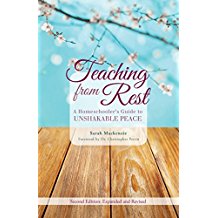With a houseful of children to both care for and teach, most homeschoolers feel their lives are anything but restful. Most of us, like Sarah Mackenzie, wake up with our minds racing, doing four things at once just to make it through the day’s tasks.
But it doesn’t have to be that way. In fact, it shouldn’t be.
In Teaching from Rest: A Homeschooler’s Guide to Unshakeable Peace, Sarah Mackenzie reminds Christian homeschoolers of what we already know and shows us how to make it our own in a practical way. The core message of this book is easy to write down but much more difficult to implement:
“…we ought to enter into God’s rest and then serve Him wholeheartedly—not out of anxiety, but out of love and trust.”
Or, in other words,
“As homeschooling moms, we are anxious and troubled about many things; one thing is needful. If we choose the good portion it will not be taken from us.”
In the first of three sections, “Whose ‘Well-Done’ are You Working For?’” we are reminded that rest is not ease, and that ‘teaching from rest’ takes diligence, attention, and a lot of hard work. What is restful about it, though, is that we turn to God for wisdom to do the right things in the right way at the right time, focusing on being faithful rather than aiming for ‘success’.
In fact, success in God’s eyes may well be quite different from what we think it is; we are called to simply be faithful and trust God for the results. We are called to love God with all of our heart, mind, soul, and strength, in front of and with our kids, when we rise up and when we walk along the way. We cannot make these dear little plants grow and bear fruit, but God can, and he uses our cultivating, thinning, and watering to do so. We just need to be faithful in these mundane tasks.
When we are overwhelmed by the enormity of the task and the endless daily-ness of each little duty, we need to remember this:
“We are weary because we forget about grace. We act as though God’s showing up is the miracle. But guess what? God’s showing up is the given. Grace is a fact.”
So we need to begin everything with prayer, everything, including our day, our year, our decade, and our math lesson.
In the second section, “Curriculum is Not Something You Buy,” we learn practical things: five ways to simplify the curriculum, a few tips for living this out, five ways to simplify the schedule. Because we have so much to do, we want to work efficiently. However, relationships just aren’t efficient “so how do we break the habits of productivity and efficiency…?” If we are clear on our goals, know how to use our days to support those goals, and pray about all these things, then we will be able to simplify until there is rest in our homes without sacrificing peace in our consciences.
The final section of the book admonishes us to “Be Who You Are!” Rather than trying to live up to the homeschooler next door, we need to learn the practical truths about how we operate best and then, playing to our strengths and learning to improve our weaknesses, we can be contented mothers who create an atmosphere where our children can thrive. For, if we want to cultivate peace in our children and our homes, we need to cultivate it in ourselves as well.
We also need to remember who our children are and how they learn. They are not projects, but little bearers of God’s image. We are not the be-all and end-all of their education but often, as Charlotte Mason said, we just need to get out of the way and put them in direct contact with great ideas.
And finally, because parents, especially teaching parents, will be imitated, we need to ensure that we are worth imitating, educationally as well as morally. We need to be serving God by “cultivating intellectual growth, nurturing creativity, diving into good books, learning new skills, working refreshment into a busy routine,” not in a frantic, checklist way but as an offering to him.
The book uses an analogy with the miracle at Cana—Christ asked that the pitchers be filled with water before he turned it into wine. He can make wine out of nothing, of course, but he wants us to work on filling our own pitchers with water, and he will turn it into wine. I’m not certain of the analogy, just as I am uncertain about a few Catholic elements in the book, but I do know it makes good educational sense for us mothers to learn and reflect so that, as we grow in loving God with all our heart, mind, soul, and strength, we are more able to teach our children well, from rest, by both example and curriculum.
As Sarah Mackenzie reminds us about our homeschooling efforts,
God doesn’t need you. But He wants to work through you.
We need to show up in trust, leaning not on our own understanding and strength, and get our marching orders for the day. We need to relieve ourselves of the burden we feel to do this work perfectly, to not mess up. We should confidently go into our day, thinking to ourselves, “Well, I’m going to make some mistakes today. Thank God for grace, His presence, and His promise to work through me!” and give it our all anyway. We know that God will use our mistakes just as thoroughly as He uses our successes, and so we rest in that.
Amen to that.
Sarah Mackenzie is right. So let us learn to focus more on God and less on ourselves; more on our children and less on success; more on what is true, honorable, just, pure, and lovely and less on curriculum. Let us find our peace in God and fill our homes with true rest—not ease or laziness but the absence of fretting and anxiety.
I have been homeschooling over two decades and, by grace, have learned many of these lessons already, though often through tears and often by mistakenly doing the opposite until God forcibly turned me around. With this book, you will be able to learn the lessons earlier on, glorifying God and benefiting your children with peace in your home and heart.
One point needs to be made. Sarah Mackenzie wrote Teaching from Rest when her six children were young. Her advice to focus lots of undivided attention on the children is invaluable when they are young, but teens may feel smothered by too much of this. Hanging out while doing something together can help them as they begin to spread their own wings. Having interests of our own, as recommended in this book, can help us be able to give them the space to grow up.
I highly recommend this book for all Christian mothers and teachers, especially homeschoolers. If you read it and take it to heart, you will be able to teach from rest. Not always, of course, but more and more, as you grow closer to God and learn to love him with all of your being.
May God bless us all and give us peace in him. Amen.
—
If you enjoyed this review, you might want to follow me on Google+, where I often mention helpful or interesting ideas, friend me on Facebook where I occasionally show up, or connect with me on GoodReads where I eventually share what I read.
Disclosure: I bought this book and encourage you to do so as well.
This article may be linked to Saturday Reviews, Booknificent Thursdays, 52 Books in 52 Weeks Challenge, Literacy Musings Monday, and The Book Nook as well as to Inspire Me Monday, Raising Homemakers, Friendship Friday, Make My Saturday Sweet.



 I watched a hibiscus flower open. While the plant was still, the emerging flower shook because of the speed with which it opened. I cannot image the incredible activity at the cellular level, the complex, coordinated frenzy of growth that leads to observable motion. Truly, God is very great!
I watched a hibiscus flower open. While the plant was still, the emerging flower shook because of the speed with which it opened. I cannot image the incredible activity at the cellular level, the complex, coordinated frenzy of growth that leads to observable motion. Truly, God is very great!

